
Errol Mark Morris is an American film director known for documentaries that interrogate the epistemology of its subjects. In 2003, his documentary film The Fog of War: Eleven Lessons from the Life of Robert S. McNamara won the Academy Award for Best Documentary Feature. His film The Thin Blue Line placed fifth on a Sight & Sound poll of the greatest documentaries ever made. Morris is known for making films about unusual subjects; Fast, Cheap & Out of Control interweaves the stories of a wild animal trainer, a topiary gardener, a robot scientist and a naked mole rat specialist.
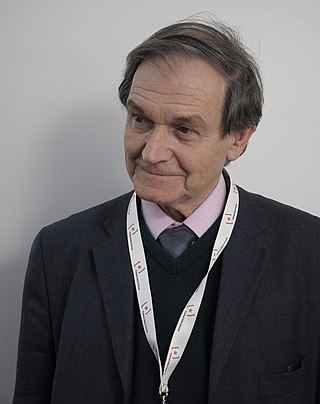
Sir Roger Penrose is an English mathematician, mathematical physicist, philosopher of science and Nobel Laureate in Physics. He is Emeritus Rouse Ball Professor of Mathematics in the University of Oxford, an emeritus fellow of Wadham College, Oxford, and an honorary fellow of St John's College, Cambridge, and University College London.
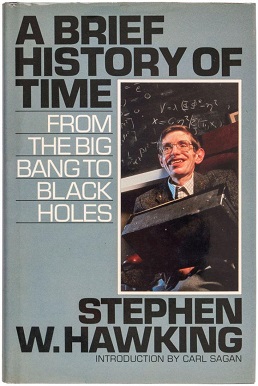
A Brief History of Time: From the Big Bang to Black Holes is a book on theoretical cosmology by English physicist Stephen Hawking. It was first published in 1988. Hawking wrote the book for readers who had no prior knowledge of physics.

The Large Scale Structure of Space–Time is a 1973 treatise on the theoretical physics of spacetime by the physicist Stephen Hawking and the mathematician George Ellis. It is intended for specialists in general relativity rather than newcomers.
Ken Lawrence is a nerdcore rapper who purports to be the late theoretical physicist Stephen Hawking rapping under the name MC Hawking.
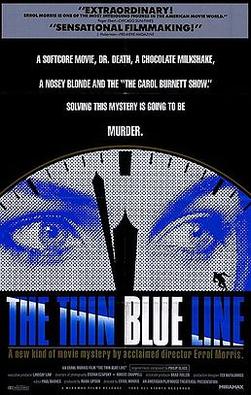
The Thin Blue Line is a 1988 American documentary film by Errol Morris, about the trial and conviction of Randall Dale Adams for the 1976 shooting of Dallas police officer Robert W. Wood. Morris became interested in the case while doing research for a film about Dr. James Grigson, a psychiatrist known in Texas as "Dr. Death" for testifying with "100 percent certainty" of a defendant's recidivism in many trials, including that of Randall Adams. The film centers around the "inconsistencies, incongruities and loose ends" of the case, and Morris, through his investigation, not only comes to a different conclusion, but actually obtains an admission of Adams' innocence by the original suspect of the case, David Harris. The "thin blue line" in the title "refers to what Mr. Morris feels is an ironic, mythical image of a protective policeman on the other side of anarchy".

Dennis William Siahou Sciama, was an English physicist who, through his own work and that of his students, played a major role in developing British physics after the Second World War. He was the PhD supervisor to many famous physicists and astrophysicists, including John D. Barrow, David Deutsch, George F. R. Ellis, Stephen Hawking, Adrian Melott and Martin Rees, among others; he is considered one of the fathers of modern cosmology.

Amal Kumar Raychaudhuri was an Indian physicist, known for his research in general relativity and cosmology. His most significant contribution is the eponymous Raychaudhuri equation, which demonstrates that singularities arise inevitably in general relativity and is a key ingredient in the proofs of the Penrose–Hawking singularity theorems. Raychaudhuri was also revered as a teacher during his tenure at Presidency College, Kolkata.
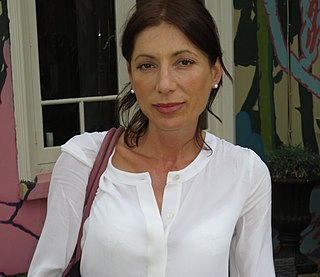
Laura Mersini-Houghton is an Albanian-American cosmologist and theoretical physicist, and professor at the University of North Carolina at Chapel Hill. She is a proponent of the multiverse hypothesis and the author of a theory for the origin of the universe that holds that our universe is one of many selected by quantum gravitational dynamics of matter and energy. She argues that anomalies in the current structure of the universe are best explained as the gravitational tug exerted by other universes.

Stephen Hawking (1942–2018), a theoretical physicist, has appeared in many works of popular culture.

Hawking is a 2004 biographical drama television film directed by Philip Martin and written by Peter Moffat. Starring Benedict Cumberbatch, it chronicles Stephen Hawking's early years as a PhD student at the University of Cambridge, following his search for the beginning of time, and his struggle against motor neuron disease. It stars Benedict Cumberbatch as Hawking and premiered in the UK in April 2004.

Stephen William Hawking was an English theoretical physicist, cosmologist, and author who, at the time of his death, was director of research at the Centre for Theoretical Cosmology at the University of Cambridge. Between 1979 and 2009, he was the Lucasian Professor of Mathematics at Cambridge, widely viewed as one of the most prestigious academic posts in the world.

Standard Operating Procedure is a 2008 American documentary film written and directed by Errol Morris that explores the meaning of the photographs taken by U.S. military police at the Abu Ghraib prison in late 2003, the content of which revealed the torture and abuse of its prisoners by U.S. soldiers and subsequently resulted in a public scandal.

Tabloid is a 2010 American documentary film directed by Errol Morris. It tells the story of Joyce McKinney, who was accused of kidnapping and raping Kirk Anderson, an American Mormon missionary in England, in 1977. The incident, known as the Mormon sex in chains case, became a major tabloid story in the United Kingdom and triggered a circulation battle between two popular tabloid newspapers, the Daily Express and the Daily Mirror.
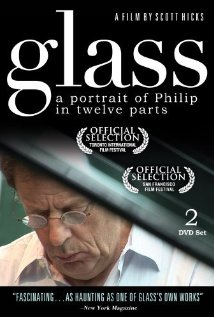
Glass: A Portrait of Philip in Twelve Parts is a 2007 documentary on the life of American composer Philip Glass directed by Scott Hicks. The film was nominated for Emmy Awards and AFI Award
Stephen Hawking: Master of the Universe is a documentary television series produced by the television broadcaster Channel 4. The subject of the series is British theoretical physicist Stephen Hawking, known for his work on black holes, who is also the presenter of the series. The series includes interviews with astrophysicist Kim Weaver, Bernard Carr, a student of Hawking's, and three theoretical physicists: Michio Kaku, Edward Witten, known for his work on superstring theory, and Lisa Randall. The first episode premiered in 2008, twenty years after the publication of Hawking's bestselling popular science book A Brief History of Time. The title is derived from a Newsweek cover.
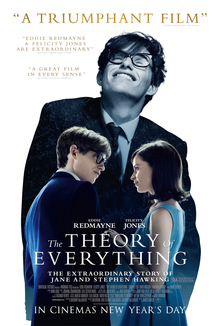
The Theory of Everything is a 2014 biographical romantic drama film directed by James Marsh. Set at the University of Cambridge, it details the life of the theoretical physicist Stephen Hawking. It was adapted by Anthony McCarten from the 2007 memoir Travelling to Infinity: My Life with Stephen by Jane Hawking, which deals with her relationship with her ex-husband Stephen Hawking, his diagnosis of amyotrophic lateral sclerosis (ALS), and his success in the field of physics. The film stars Eddie Redmayne and Felicity Jones, with Charlie Cox, Emily Watson, Simon McBurney, Christian McKay, Harry Lloyd, and David Thewlis featured in supporting roles. The film had its world premiere at the 2014 Toronto International Film Festival on 7 November 2014. It had its UK premiere on 1 January 2015.

The Unknown Known is a 2013 American documentary film about the political career of former U.S. Secretary of Defense and congressman Donald Rumsfeld, directed by Academy Award winning documentarian and filmmaker Errol Morris. It is a summary of 33 hours of interviews that Morris conducted with Rumsfeld over eleven separate sessions during visits to Newton, Massachusetts. The film was released on April 4, 2014, by Radius-TWC, and is dedicated to the memory of Roger Ebert.

Particle Fever is a 2013 American documentary film tracking the first round of experiments at the Large Hadron Collider (LHC) near Geneva, Switzerland. The film follows the experimental physicists at the European Organization for Nuclear Research (CERN) who run the experiments, as well as the theoretical physicists who attempt to provide a conceptual framework for the LHC's results. The film begins in 2008 with the first firing of the LHC and concludes in 2012 with the successful identification of the Higgs boson.
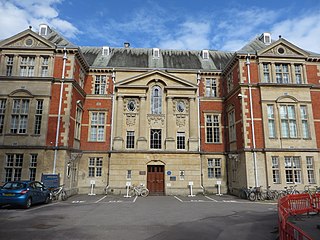
The Department of Physics at the University of Oxford is located on Parks Road in Oxford, England. The department consists of multiple buildings and sub-departments including the Clarendon Laboratory, Denys Wilkinson's building, Dobson Square and the Beecroft building. Each of these facilities contribute in studying different sub-types of physics such as Atomic and Laser Physics, Astrophysics, Theoretical Physics, etc. The physics division have made scientific contributions towards this branch of science since the establishment of the department.


















